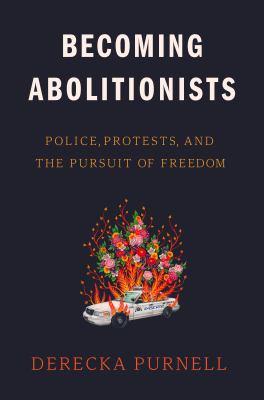
Becoming abolitionists : police, protests, and the pursuit of freedom
For more than a century, activists in the United States have tried to reform the police. From community policing initiatives to increasing diversity, none of it has stopped the police from killing about three people a day. Millions of people continue to protest police violence because these solutions do not match the problem: the police cannot be reformed. In Becoming Abolitionists, Purnell draws from her experiences as a lawyer, writer, and organizer initially skeptical about police abolition. She saw too much sexual violence and buried too many friends to consider getting rid of police in her hometown of St. Louis, let alone the nation. But the police were a placebo. Calling them felt like something , and something feels like everything when the other option seems like nothing. Purnell details how multi-racial social movements rooted in rebellion, risk-taking, and revolutionary love pushed her and a generation of activists toward abolition. The book travels across geography and time, and offers lessons that activists have learned from Ferguson to South Africa, from Reconstruction to contemporary protests against police shootings. Here, Purnell argues that police can not be reformed and invites readers to envision new systems that work to address the root causes of violence. Becoming Abolitionists shows that abolition is not solely about getting rid of police, but a commitment to create and support different answers to the problem of harm in society, and, most excitingly, an opportunity to reduce and eliminate harm in the first place.
Available Copies by Location
| Location | |
|---|---|
| Community Centre | Available |
Browse Related Items
- ISBN: 9781662600517
- Physical Description 288 pages ; 25 cm
- Publisher [Place of publication not identified] : [publisher not identified], 2021.
Additional Information
| LDR | 02627nam a2200301 i 4500 | ||
|---|---|---|---|
| 001 | 247810 | ||
| 003 | NFPL | ||
| 005 | 20210929113255.0 | ||
| 008 | 210719s2021 nyu e 000 0 eng | ||
| 020 | . | ‡a9781662600517 ‡q(hardcover) | |
| 035 | . | ‡a(OAUW)435477 | |
| 040 | . | ‡aCaOAUW ‡beng ‡erda ‡cCaOAUW | |
| 082 | 0 | 4. | ‡a363.2/32 ‡223 |
| 100 | 1 | . | ‡aPurnell, Derecka. ‡0(DLC)no2021118446 ‡0(NFPL)76539 |
| 245 | 1 | 0. | ‡aBecoming abolitionists : ‡bpolice, protests, and the pursuit of freedom / ‡cDerecka Purnell. |
| 264 | 1. | ‡a[Place of publication not identified] : ‡b[publisher not identified], ‡c2021. | |
| 264 | 1. | ‡aNew York, NY : ‡bAstra House, a division of Astra Publishing House, ‡c[2021] | |
| 300 | . | ‡a288 pages ; ‡c25 cm | |
| 336 | . | ‡atext ‡btxt ‡2rdacontent | |
| 337 | . | ‡aunmediated ‡bn ‡2rdamedia | |
| 338 | . | ‡avolume ‡bnc ‡2rdacarrier | |
| 520 | . | ‡aFor more than a century, activists in the United States have tried to reform the police. From community policing initiatives to increasing diversity, none of it has stopped the police from killing about three people a day. Millions of people continue to protest police violence because these solutions do not match the problem: the police cannot be reformed. In Becoming Abolitionists, Purnell draws from her experiences as a lawyer, writer, and organizer initially skeptical about police abolition. She saw too much sexual violence and buried too many friends to consider getting rid of police in her hometown of St. Louis, let alone the nation. But the police were a placebo. Calling them felt like something , and something feels like everything when the other option seems like nothing. Purnell details how multi-racial social movements rooted in rebellion, risk-taking, and revolutionary love pushed her and a generation of activists toward abolition. The book travels across geography and time, and offers lessons that activists have learned from Ferguson to South Africa, from Reconstruction to contemporary protests against police shootings. Here, Purnell argues that police can not be reformed and invites readers to envision new systems that work to address the root causes of violence. Becoming Abolitionists shows that abolition is not solely about getting rid of police, but a commitment to create and support different answers to the problem of harm in society, and, most excitingly, an opportunity to reduce and eliminate harm in the first place. | |
| 650 | 0. | ‡aPolice. ‡0(DLC)sh 85104183 ‡0(NFPL)124429 | |
| 650 | 0. | ‡aPolice brutality. ‡0(DLC)sh 95010616 ‡0(NFPL)109969 | |
| 650 | 0. | ‡aPolice misconduct. ‡0(DLC)sh 96000078 ‡0(NFPL)109989 | |
| 905 | . | ‡uteveraert | |
| 930 | . | ‡aMARCIVE (022023) | |
| 901 | . | ‡a247810 ‡bAUTOGEN ‡c247810 ‡tbiblio ‡sSystem Local | |

